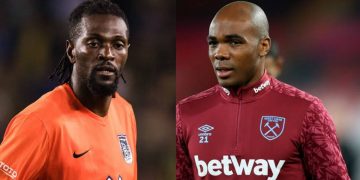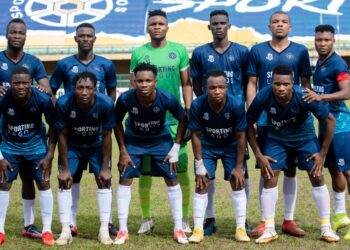Nigeria has a lot of potential in the diaspora who are doing amazingly well in the football team of other countries but have refused or rather, decided not to bring their talent to play in their country of origin for reasons best known to them.
Does it make them unpatriotic or not proud of their country? Your guess is as good as mine.
In this article, I will be listing top 10 footballers who are Nigerians but have snubbed playing for the Nigerian national team.
1. Emmanuel Adebayor:
Emmanuel Sheyi Adebayor was born in Lome, Togo, to Nigerian parents and he currently plays for Tottenham Hotspurs in England and the Togo National Team. He previously played for AS Monaco, Arsenal, Real Madrid and Manchester City.
Adebayor was eligible to play for Nigeria but chose to represent the country of his birth. He was voted African Player of the Year in 2008 while playing for Togo. He has played for them 57 times. He is currently Togo’s all-time top goalscorer with 28 goals.
2. Angelo Ogbonna:
Ogbonna was born to Nigerian parents who emigrated to Italy from Nigeria in 1988.
He made his debut for Italy back in November 2011 in a friendly 2–0 win against Poland, where he came on as a substitute. He was also included in the Italian 23-man final squad for UEFA Euro 2012, but never played in any match during the competition. He finished the tournament with a Silver medal though. He currently plays for Juventus after his “big money” moves from Torino.
3. Oguchi Onyewu:
Oguchialu Chijioke “Oguchi” Onyewu (born May 13, 1982) is an American soccer and central defender who currently plays for Charlton Athletic FC. He has also played for clubs in France, Belgium, England, Italy, the Netherlands, and Portugal. Onyewu’s parents moved to the United States from Nigeria to study in Washington, D.C. He made his first appearance for the senior national team on October 13, 2004, against Panama. Onyewu scored his first international goal in the 2005 Gold Cup, nodding home the extra time winner in the semifinal against Honduras, and was later named in the tournament’s Best XI. He has been capped by USA 64 times.
4. David Alaba:
David Olatokunbo Alaba was born in Vienna to a Filipino mother (a nurse) and a Nigerian father, (a DJ and former rapper). He currently plays for Bayern Munich and the Austria national football team.
He has played several roles, including central midfield, right and left-wing. In October 2009, he was called up to the senior Austria national team for a match against France. He made his debut in this game, making him the youngest player in the history of the Austrian national team. He has since been capped by Austria 26 times. He is unarguably one of the top left-backs in football presently.
5. Stefano Okaka Chuka:
Stefano Chuka Okaka was born 9 August 1989 in Castiglione del Lago, Perugia, Italy, to Nigerian parents who later obtained Italian citizenship. Okaka joined the Roma youth system in 2004.
He is currently an Italian International who plays as a striker for Spezia Calcio on loan from Serie A club, Parma. After gaining Italian citizenship in 2007, Okaka was selected for the Italian Under-19 side. He made his debut for the Italy U-20 team in 2008, scoring two goals. On November 17 2009, he made his debut with the Italy U-21 squad in a match against Luxembourg.
In April 2014, Okaka revealed he talked with the Nigeria Football Federation about the possibility of him playing with the Nigeria national football team at the 2014 FIFA World Cup.
6. Dennis Aogo:
Born to a Nigerian father and a German mother, Aogo grew up in Oberreut, a suburb in the south-west of Karlsruhe. Aogo is capable of playing either as a left back or a defensive midfielder. He currently plays for FC Schalke 04 (on loan from Hamburger SV) and the German national team.
Nigeria gave him the chance to play for them at the 2010 FIFA World Cup in South Africa but on the 5th of January 2010, Aogo announced that he will only play for Germany. He made his national team debut for Germany in a friendly match against Malta in a 3–0 victory on 13 May 2010, playing 79 minutes before being replaced by Jérôme Boateng. He has been capped 12 times since then.
7. Patrick Olukayode Owomoyela:
Patrick Owomoyela was born 5 November 1979, to a German mother and a Nigerian father. Owomoyela plays as a right-sided defender/midfielder.
He is a German footballer who is currently a free agent, having last played for German Bundesliga club, Borussia Dortmund. He previously played for Lüneburger SK, VfL Osnabrück, SC Paderborn 07, Arminia Bielefeld, SV Werder Bremen,Borussia Dortmund and Hamburger SV II.
He made his debut for Germany in an Asian tour, playing 90 minutes in a 3–0 win over Japan, on the 16th of December 2004, in Yokohama. Since then, he has had 11 caps to his name.
8. Carl Ikeme:
Carl Onora Ikeme (born 8 June 1986) is a footballer who plays for Wolverhampton Wanderers as a goalkeeper. Despite his English birthplace, he has chosen to represent Nigeria at the international level. He has been called up to the Super Eagles squad but has not yet played for them.
9. Gabriel Agbonlahon:
Gabriel Imuetinyan “Gabby” Agbonlahon was born 13 October 1986. Agbonlahon was one of four children born to a Nigerian father and a Scottish mother in Birmingham. Agbonlahon’s ancestry qualifies him to play for Scotland or Nigeria at international level, but he chose to play for his homeland, England.
Agbonlahon is a product of Aston Villa’s Academy and still plays for the club. He is also Aston Villa’s all-time leading Premier League goalscorer. On November 19, he made his international debut against Germany. He played for 76 minutes. Since then he has earned only three caps for the English national team.
10. Nedum Onuoah:
Chinedum “Nedum” Onuoha (born 12 November 1986) is a footballer who plays for Queens Park Rangers. He is a defender, typically a centre-back, but he can also play at right back or left back. Though born in Warri, Nigeria, Onuoha was brought up in Manchester, England.
In March 2007, Onuoha received an international call-up from Nigeria but announced he would like to play for England at full international level. Onuoha has never been capped by England at the international level.
There is a huge possibility, that if all these Nigerians in the diaspora were integrated into the national team, Nigeria will be at the very top both on the African level and internationally.















